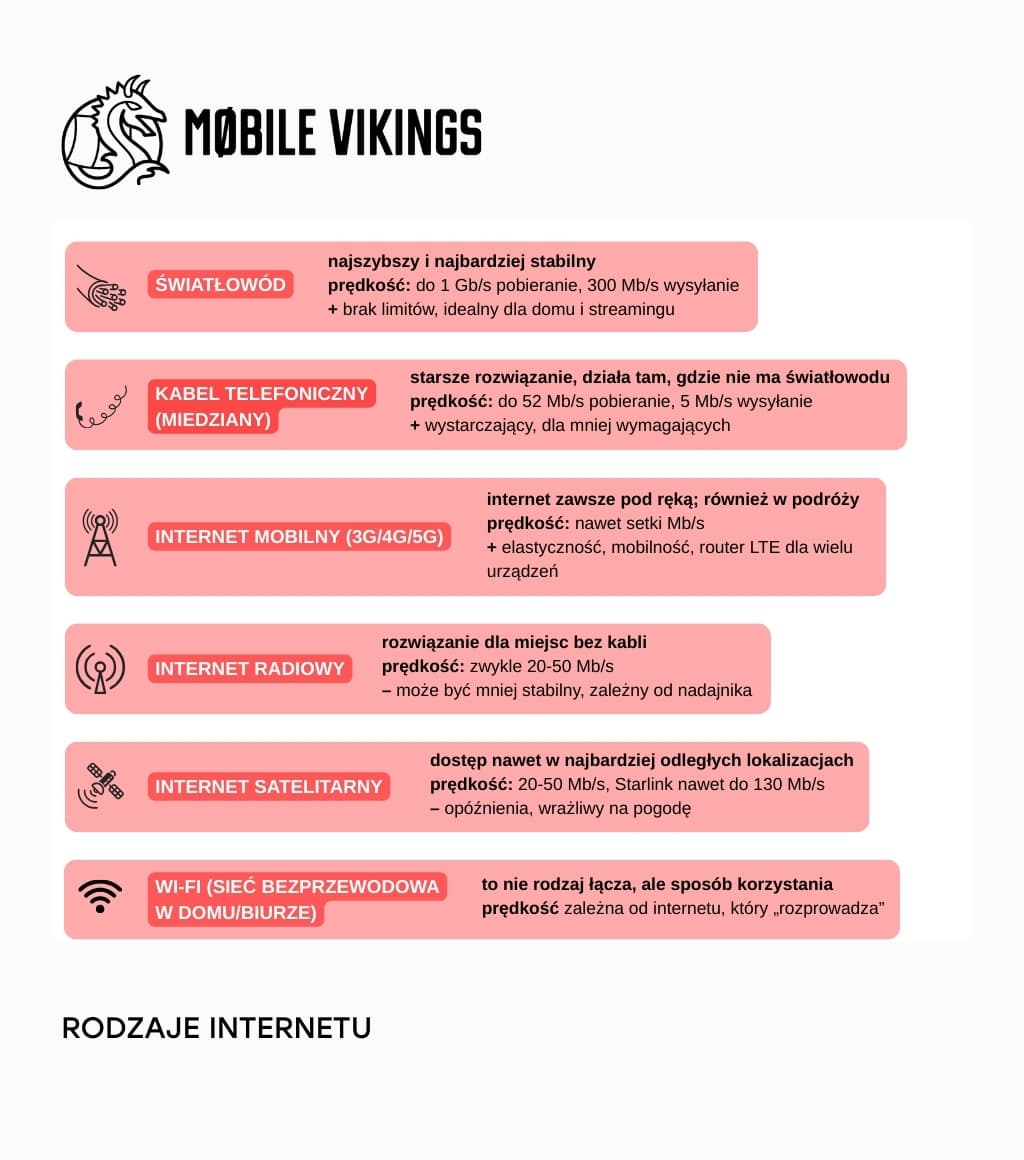Mobile or fixed internet? Fiber optic, radio, or satellite network? The number of types of internet and internet connections is quite large, and they can differ in coverage, data limits, speed, or connection installation method. Your lifestyle and daily habits are the compass that will point you to the best solution. What are the main types of internet and how do they differ from each other? You will find out in this article.
Key information from the article
- Internet is divided into two main categories: wired (fiber optic, copper cable) and wireless (Wi-Fi, mobile internet, radio, and satellite).
- Fiber optic is the fastest and most stable type of internet, offering speeds up to 1 Gb/s and free from transfer limits.
- Mobile internet provides free access to the network on the go and, thanks to 4G and 5G technologies, matches the speed of many fixed connections.
- Radio and satellite internet allow you to use the network in places where other solutions are unavailable, but they are characterized by lower stability and higher latency.
- The choice of the best type of internet should be tailored to your lifestyle – people who use the internet mainly at home will find fiber optic best, while those who travel or work remotely will find mobile internet best.
Main types of internet – wired and wireless
As a global computer network, the internet is divided into two basic categories: wired internet and wireless internet. Wired internet uses physical cables, which can be fiber optic or copper, while wireless internet is based on radio waves and includes technologies such as Wi-Fi, cellular networks, and satellite internet.
Wired internet – fast and stable access thanks to cables
Among the types of wired internet, the most popular are fiber optic connections and internet via telephone cable (copper). Fiber optic cables use light waves for data transmission, allowing for very high speeds – up to 1 Gb/s for downloading and 300 Mb/s for uploading. This makes fiber optic one of the fastest and most reliable types of broadband internet available on the market. In other words: if you want to surf the web like a longship on the open sea – fiber optic gives you that power.
Internet via telephone cable
Internet via telephone cable, utilizing digital network access technology, is an alternative to fiber optic, especially in smaller towns where fiber optic has not yet arrived. It requires the installation of a modem and appropriate filters to allow simultaneous internet use and phone calls. However, the speeds of this type of connection are significantly lower – up to about 52 Mb/s for downloading and 5 Mb/s for uploading. For less demanding users – it's enough, but for Valhalla, for 4K streaming, it's better to aim higher.
Wireless internet – flexibility and mobility thanks to radio waves
Wireless internet is a broad category encompassing technologies that use radio waves for data transmission. It includes Wi-Fi networks, cellular internet (3G, 4G, 5G), and satellite internet. Mobile internet enables network access on the go, which is particularly important for people who travel a lot or work remotely away from home. In speed tests, it can put many "fixed" internet connections to shame – and all without cables tangling at your feet.
Also check out this article: Mobile internet vs fixed – differences
Satellite internet
Satellite internet is another type of wireless internet that enables network access in hard-to-reach places where other technologies fail. Download speeds for such connections usually range from 20 to 50 Mb/s, although Starlink, owned by Elon Musk, offers up to 130 Mb/s. However, the disadvantages of satellite internet include transmission delays and sensitivity to atmospheric conditions. A storm? Clouds? These can cause trouble – a satellite isn't always a reliable companion for a voyage.
What speeds do different types of internet offer?
Internet speed is one of the key criteria for choosing the right type of connection. Fiber optic provides the fastest data transfer, reaching up to 1 Gb/s for downloading and 300 Mb/s for uploading. This is an ideal solution for people who use the internet intensively, without transfer limits.
Internet via telephone cable offers significantly lower speeds – up to about 52 Mb/s for downloading and 5 Mb/s for uploading, which may be sufficient for less demanding users.
Radio and satellite internet, although less fast, provides access where other technologies are not available. Download speeds in these networks range from 20 to 50 Mb/s, with the possibility of achieving higher values with modern satellite solutions.
Broadband internet vs other types of internet – what's the difference?
Broadband internet is a concept referring to high-speed internet access, which can be provided by both wired internet (fiber optic, copper cable) and wireless internet (e.g., 5G). Its main advantage is fast data transfer, which allows for comfortable use of online services, multimedia data transmission, and global communication. In short: broadband = zero frustration, because everything works smoothly.
Other types of internet, such as mobile or satellite, although also able to offer fast access, often come with data limits or less stable connections. It is therefore worth considering which type of broadband internet best suits your needs.
How lifestyle and internet usage affect the choice of internet type?
Choosing the right type of internet should be tailored to your lifestyle and how you use the network. If you travel a lot or work remotely away from home, mobile internet, using 3G, 4G, or 5G technologies, will be ideal for you. You can use it with a SIM card in your phone or with an LTE router, which allows you to connect multiple devices.
What if you use the internet mainly at home? Do you then need a stable, fast connection without limits? In that case, wired internet, especially fiber optic, will be the best choice. However, if you live in a smaller town without fiber optic access, it is worth considering internet via telephone cable or wireless radio or satellite internet.
Fixed internet, but without a cable – is it possible?
In places where wired internet access is unavailable, you can use fixed wireless internet, based on radio or satellite networks. Although they do not offer speeds as high as fiber optic, they provide internet access in hard-to-reach locations. The downside is greater susceptibility to atmospheric conditions and transmission delays, especially with satellite internet.
Summary – choose the type of internet tailored to your needs
Types of internet are diverse, and each has its advantages and limitations. Wired internet, using fiber optic or copper cables, provides fast and stable network access without data limits. Wireless internet, including cellular networks, Wi-Fi, and satellite internet, offers greater mobility and access in hard-to-reach places.
The most important thing? Don't overpay and don't waste the connection's potential – match your choice to your lifestyle. Today, the internet is the foundation of our well-managed daily reality. We, the Vikings, know one thing: a well-chosen connection is like a sturdy helmet on deck – it gives peace and freedom.











